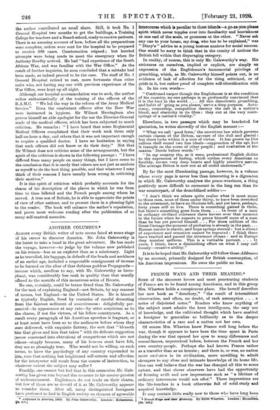ANOTHER COLUMBUS.*
ALMOST every British writer of note seems fated at some stage of his career to discover America. Mr. John Galsworthy is the latest to take a hand in the great adventure. He has made the voyage, however—to judge by the volume now published on his return—less as an explorer than as a missionary. Light as he travelled, his baggage, in default of the beads and necklaces of an earlier age, included a respectable consignment of incense to be burned on the altar of that dubious goddess Propaganda— incense which, needless to say, with Mr. Galsworthy as hiero- phant, was considerably less rank in quality than that usually offered to the nostrils of this monstrous scion of Hecate.
No one, certainly, could be better fitted than Mr. Galsworthy for the task of explaining England—not Britain, by any manner of means, but England—to the United States. He is himself so typically English, freed by centuries of careful decanting from the faintest sediment of assertiveness : delightfully per- meated—in appearance at any rate—by utter scepticism as to the charm, if not the virtues, of his fellow-countrymen. As a result every paragraph of his American speeches is fragrant, or at least must have been so to the audiences before whom they were delivered, with exquisite flattery, the sort that " blesseth him that gives and him that takes " with its delicate suggestion (never coarsened into obtrusion) of comparisons which are not odious—simply because, many of his hearers must have felt, they are so pleasingly true. Who would not be willing, on such terms, to have the psychology of any country expounded to him, sure that nothing but heightened self-esteem and affection for the interpreter will result from the course of instruction, to whatever extent the subject may suffer ?
Frankly, one cannot but feel that in this connexion Mr. Gals- worthy has given rein beyond due measure to his master-passion of understatement. Englishmen do not trade on their charm. but few of them are as devoid of it as Mr. Galsworthy appears to consider them. After all, many distinguished foreigners have professed to find in English society an element of agreeable
• Addresses in America. 1919. By John Galaworthy. London : Heinemann. VS. not]
intercourse which is peculiar to these islands—a, go-as-you-please spirit which never topples over into familiarity and boorishness at one end of the scale, or grossness at the other. " Never ask any one to your house, my des. who has to be explained," was " Dizzy's " advice to a young hostess anxious for social success. One would be sorry to think that in the comity of nations the British fell within that disparaging category.
In reality, of course, this is only Mr. Galaworthy's way. His strictures on ourselves, implied or explicit, are simply an expression of the Englishman's immemorial privilege of grumbling, which, as Mr. Galsworthy himself points out, is no evidence of lack of affection for the thing criticized, or of pride in it, but rather proof of complete self-identification with it. In his own words--
" Confirmed carper though the Englishman is at the condition of his country, no one perhaps is so profoundly convinced that it is the best in the world. . . . All this democratic grumbling, and habit of ` going as you please,' serve a deep purpose. Auto- cracy, censorship, compulsion destroy the salt in a nation's blood, and elasticity in its fibre : they cut at the very main- springs of a nation's vitality."
Elsewhere, in two passages which may be bracketed for quotation, he writes shrewdly of the English manner
What we call ' good form,' the unwritten law which governs certain classes of the Briton, savours of the dull and glacial : but there lurks within it a core of virtue. It has grown up like callous shell round two fine ideals—suppression of the ego lest it trample on the corns of other people ; and exaltation of the maxim Deeds before words.' "
" In my country the, as it were, professional English dislike to the expression of feeling, which strikes every American so forcibly, covers very deep hearts and highly sensitive nerves. The average Briton is now not at all stolid underneath."
By far the most illuminating passage, however, in a volume whose every page is never less than interesting is a digression in which Mr. GaLsworthy analyses the peace-weariness, a thing positively more difficult to surmount in the long run than its war counterpart, of the demobilized soldier :-
" I don't think we others quite realize what it must mean to those men, most of them under thirty, to have been stretched to the uttermost, to have no illusions left, and yet have, perhaps, forty years still to live. There is something gained in them, but there's something gone from them. . . . In front of a man in ordinary civilized existence there hovers ever that moment in the future when he expects to prove himself more of a man than he has yet proved himself. . . . For these soldiers of the Great Carnage the moment of probation is already in the past. . . . Human nature is.elastic, and hope springs eternal : but a climax of experience and sensation cannot be repeated : I think these have reached and passed the uttermost climax : and in Europe they number millions. This is a veritable portent. . . . It must, I think, have a diminishing effect on what I may call loosely—creative ability."
It is to be hoped that Mr. Galsworthy will follow these Addresses by an account, primarily designed for British consumption, of his American impressions. He owes the public no less.


































 Previous page
Previous page